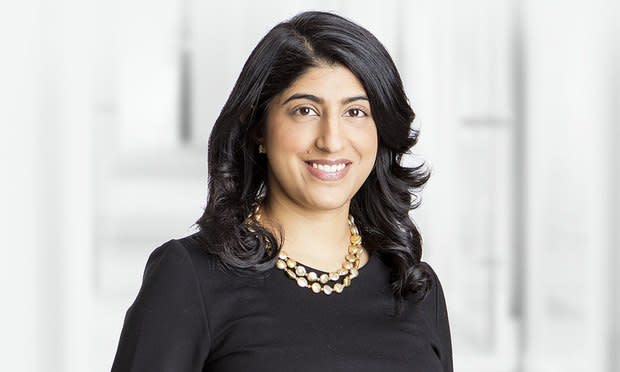Q&A: Cohen Milstein's Kalpana Kotagal on Fighting Discrimination

Kalpana Kotagal, a partner with Cohen Milstein Sellers & Toll. Courtesy photo
A year ago the actress Frances McDormand, accepting an Oscar at the Academy Awards, pushed her fellow stars to learn about the so-called inclusion rider as part of a drive to boost diversity across the film industry.
That moment was surreal for Kalpana Kotagal, the Cohen, Milstein, Sellers & Toll partner who helped write the language for such provisions. The rider is essentially a contract that influencers in Hollywood can use to require studios and other partners to employ diverse workers on set.
The idea sprung from the Media, Diversity and Social Change Initiative at the University of Southern California’s Annenberg School for Communication and Journalism. The initiative was founded and directed by professor Stacy Smith. Kotagal connected with Smith through Anita Hill, who is of counsel at Cohen Milstein.
We spoke with Kotagal about inclusion riders, how corporations are reckoning with the new focus on harassment, and what's next. The conversation that follows was edited for length and clarity.
NLJ: What’s the background on the inclusion rider?
Kotagal: Actors use their clout in the industry to push for change in any given project. I had previous done some thinking about the Rooney Rule and its inspiration and where it’s fallen short. The Rooney Rule inspired by the National Football League just requires an employer to bring in a nonwhite candidate into the process. It doesn’t ask for consideration for hiring. We wanted to think about influencing roles behind the camera, as well as on screen. I helped write the legal language. We met with a lot of talented lawyers and agents. We were working through this language through the industry. We refined and refined. Eventually we were really working to get people to adopt it. In that time period Frances McDormand heard from her agent. Then, bam, she won the Oscar and we were totally surprised. What Frances did by supercharging it created this space for the A-listers and talent to say, “We are committed.”
How does the inclusion rider work?
Candidates from historically underrepresented backgrounds are explicitly included in the auditioning and interviewing process, and we have a provision in there that requires auditions to be held in places that are accessible for those with limitations. The next part goes further and sets to encourage to hire and cast highly qualified folks. It could happen at a variety of different stages, including early in the production process.
How could Hollywood’s diversity efforts affect other industries?
The legal profession is an example. Hollywood’s certainly not alone. We all have to do better on the hiring front. I would also say that it’s important as we think about what are the preconditions for real equality of opportunity that go past hiring. We need to be challenged to think about pay equity and the evaluation process and access to assignments and how we think of accommodations and leave for caregiving. We need to think about some of the coercive mechanisms like forced arbitration that keep workers from vindicating their rights, as well as wage theft and other systemic issues that disproportionately affect low-paid workers. The hiring piece of this is great but not sufficient.
The #TimesUp movement sparked a conversation about diversity and equality in Hollywood, as well as the corporate world. How do you see that conversation continuing?
I think a constant focus and renewed focus is an important part of what comes next. In my practice we are continuing to look for the kinds of problems that give rise to systemic discrimination. There are more subtle issues, such as pregnancy discrimination, than the #MeToo movement. These issues underscore how power and balance in workplaces can lead to what are systemic problems.
Read more:
11th Circuit Pregnancy Bias Case Tests 2015 Supreme Court Ruling
Chai Feldblum, Obama-Era EEOC Member, Joins Morgan Lewis as Partner
US Justice Dept. Argues Against Extending Reach of 'Janus' Ruling
Gig Economy Plaintiffs Will Test-Drive New SCOTUS Ruling Against Arbitration


